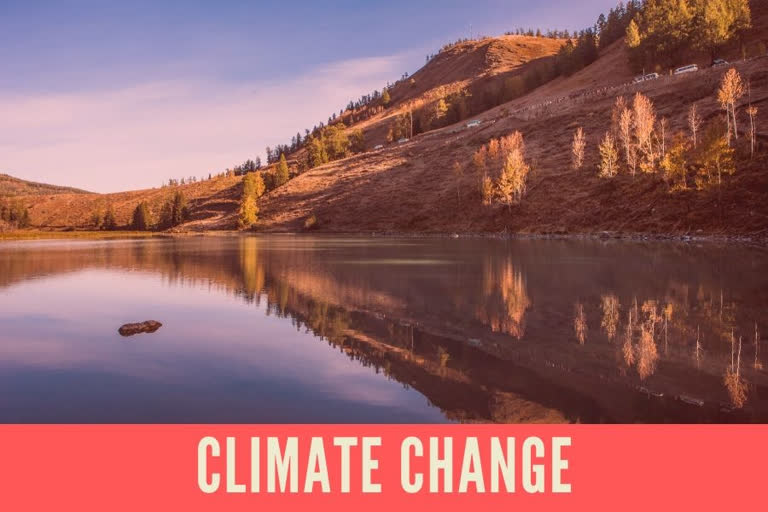New Delhi: The time has come to protect the environment - it's either now or never. Yes, the season-ending spring is vanishing behind the sails of memories. With hope, the world is creating bridges to enter into the new and modern era. Now, the questions lies in what could be the challenges, if there are ways to solve them, if we can witness a 'peaceful' decade and how can we protect ourselves from the next apocalypse!
There is no doubt that we are sitting by the fireplace and assuring ourselves that it is just warm and the fire is not burning us!
How effectively are we addressing climate change for the next decade?
Living in denial
Recently, the city of Chennai was completely flooded due to unprecedented torrential rains and immediately after the floods, there wasn’t a drop of drinking water available and the entire city has been pushed towards acute drinking water scarcity.
Likewise, the city of Mumbai was water-clogged due to heavy downpour of unseasonal rains, while the farmers have been thriving for the right amount of rainfall, for agriculture needs.
Such continuous rainfall leads to water clogs and drains which in turn become the breeding ground of various insects like mosquitoes, resulting in dangerous illnesses like dengue, cholera and others.
Can you believe that the root cause of all these issues is 'climate change'? Have you ever wondered if there is a direct relation between climatic change and the rate of the onions in the market?
Environmentalists proclaim that premature and unprecedented rains and crop losses are the results of erratic climatic changes, thus reducing the harvest of onions. This shortage of onion produce is clearly the reason why the market price of onions has flared up beyond a common person's reach!
THE SCARY PICTURE OF THE UPCOMING DECADE
Global warming: Earth's surface temperatures have already risen by 1-degree centigrade. If it rises by another degree i.e., to 2 degrees, the icebergs and the Himalayas will melt, thus posing a great threat to coastal areas, which might get submerged. Hence, the immediate action should be to see that global temperature does not exceed a maximum of 1.5 degrees.
Organic Emissions: With the stormy use of coal and Petroproducts, the concentration of carbon emissions in the atmosphere is increasing from a maximum of 300 PPM to a record 400 PPM. This decade's challenge is tackling emissions that are contributing to global warming. Preventing these carbon emissions and eliminating what's already accumulating in the environment is the current problem at hand. It takes over 200 years for them to dissolve and mix in the oceans.
READ: India's forest cover has risen by over 5,000 sq. km
WHAT CAN WE DO?
For over 3 decades now, several countries and international organizations have been trying to curb climate change, starting from Rio Charitable Conference (1992) to the Paris Agreement (2016). It should not be the sole responsibility of the governments, but at the individual level, we also have a vital role to play in being climate-conscious.
Don’t cut them, nurture and grow them
Plants and forests are crucial in the elimination of carbon emissions. Forests should be conserved. Cutting down of existing trees should be stopped. Instead, each one of us should partake in this event, as a movement. Care should be taken to not just plant the tree and forget, but to see their well being till the plant grows into a tree.
Embrace electricity
Petrol and diesel vehicles account for the bulk of carbon emissions. Therefore, it is imperative to turn to electric vehicles within this decade. Many companies are planning to halt production of diesel and petrol vehicles in the next 2-5 years. The world is rapidly moving toward solar and wind resources.
Reduce usage of cars
Don't waste fuel by travelling alone in a car meant to carry about 4 to 5 people. You can take some others who are going on the same route. Rather than using motor vehicles, walk or cycle to nearby locations. There should be policies designed to ensure maximum utilisation of public transport facilities.
Get a home closer to work
Care should be taken to see that your residence is as close to the working area as possible, which in turn will reduce vehicular usage and pollution.
Environment-friendly Homes
Build homes and offices that are completely ventilated, environment-friendly and ensure that rainwater is completely utilised and not wasted.
Plastic-free
Experts say that "refuse" should also be added to the slogan 'Reuse, Recycle, Reduce', which is already in practice in case of plastics at present.
Like the 'odd-even’ car system in Delhi, in some countries, policies have been launched to observe ‘open streets’, which bans vehicles on the highways for a few hours on holidays. This is being slowly introduced in a few states of the nation too.
The United Nations’ mission
The UN aims to bring down greenhouse gas emissions to 45 per cent by 2030 and to 0 by the end of 2050, thereby reducing global warming.
Shareholders of the above exercise:
| Countries | 192 |
| Cities | 10,455 |
| Companies | 3,676 |
| Investors | 1,136 |
| Organizations | 1,323 |
READ: Seelampur violence: Court asks jail officials reason of not furnishing medical reports of 2 accused



